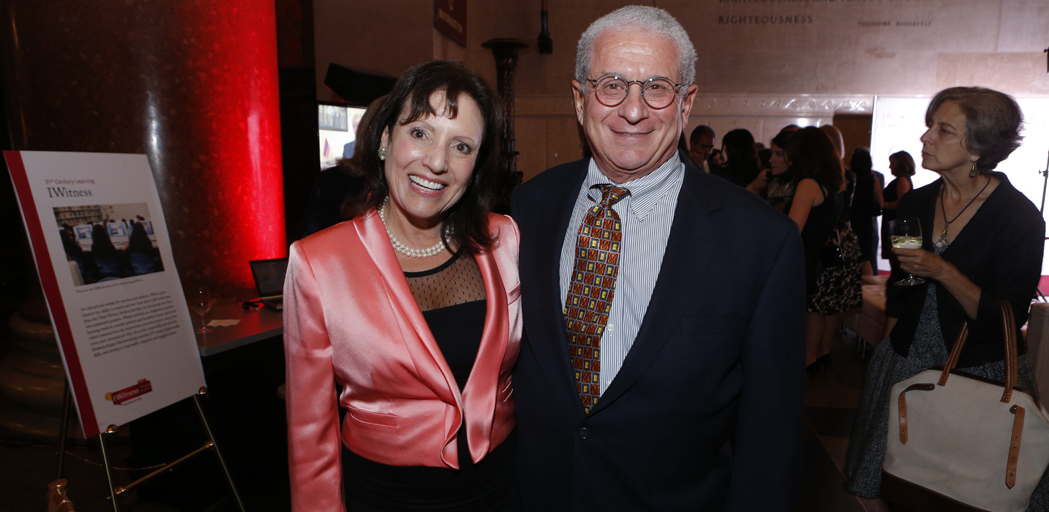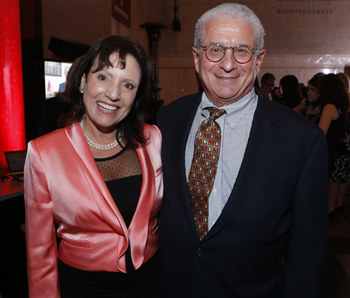Margee and Douglas Greenberg Gift to USC Shoah Foundation Center for Advanced Genocide Research Will Endow First Academic Research Fellowship

 Margee and Douglas Greenberg have provided a gift to fund an endowed fellowship program at USC Shoah Foundation’s Center for Advanced Genocide Research, the newly announced research and scholarship unit of the Institute housed on the campus of the University of Southern California.
Margee and Douglas Greenberg have provided a gift to fund an endowed fellowship program at USC Shoah Foundation’s Center for Advanced Genocide Research, the newly announced research and scholarship unit of the Institute housed on the campus of the University of Southern California.
The Margee and Douglas Greenberg Research Fellowship is the first endowed fellowship for the Center, and will enable one scholar to spend up to one month in residence at USC Shoah Foundation’s Center for Advanced Genocide Research every year, while also providing financial support during the scholar’s stay.
“The genesis of the fellowship was Margee’s and my desire to repay the Shoah Foundation for the profound life-changing experience we had when I was executive director,” Douglas Greenberg said. “Our hope was really to secure our connection to the Institute permanently, a connection that we feel every day.”
Douglas Greenberg served as the executive director of USC Shoah Foundation from 2000 to 2008 and is now a distinguished professor of history at Rutgers University. During his tenure as executive director he oversaw the transition that made the Institute a part of USC in 2006.
Margee Greenberg, a staff coordinator in the Office of Disability Services at Rutgers, donated many hours as a volunteer for the Institute. “As a longtime volunteer with the Institute, I’ve seen firsthand the immense value of the Visual History Archive as a tool for scholarship,” she said. “This fellowship provides an opportunity to expand research in the archive that will advance our knowledge of one of history’s darkest hours.”
In acknowledging the importance of the endowment, current USC Shoah Foundation Executive Director Stephen D. Smith said, “This extraordinarily generous gift from Margee and Douglas Greenberg will ensure that future scholars will be able to pursue their studies and research, most notably by using the Visual History Archive to make advancements in the field of Holocaust and genocide studies.”
Center Director Wolf Gruner said the endowment gift provides crucial and perpetual support for the new Center.
“We are very pleased to announce the inaugural Greenberg Research Fellow is Jared McBride, a recent PhD undertaking a sophisticated micro-historical study of collaboration and resistance in the Ukraine,” he said. “We all look forward to supporting his research with USC Shoah Foundation video testimonies and to learning from his scholarly expertise.”
McBride is a Soviet and Eastern European history Scholar at UCLA. He was selected by a panel of USC researchers and professors for the originality of his proposal and its potential to advance research with testimonies in the Visual History Archive.
McBride, who recently earned his doctorate, is working on transforming his dissertation into a book that probes the little-known lives and experiences of ordinary citizens who survived the Holocaust in the Nazi-occupied region of Wolyn in what is now western Ukraine.
In January, McBride will spend 10 days at the Center viewing testimony for his dissertation and book. He will also give a public talk about his research that Margee and Douglas Greenberg will attend.
“Whatever source base I have for the dissertation, the fellowship will allow me to double that,” McBride said. “Being able to back things up with testimony, triangulating sources, is a really big deal -- especially in these early phases, when a lot of this new history is being written for Eastern Europe.”
The Center for Advanced Genocide Research is uniquely positioned at USC, the only world-renowned private research institution with substantial original material from the Holocaust and other genocides. Primary resources include private papers of Jewish emigrants from the Third Reich in the Special Collections of USC Doheny Memorial Library, the Holocaust and Genocide Studies Collection at the USC Doheny Library, and USC Shoah Foundation’s Visual History Archive, which contains more than 53,000 testimonies of witnesses to the Holocaust and other genocides, including the Rwandan Tutsi Genocide and the Nanjing Massacre. Testimonies from survivors of the Armenian Genocide will be integrated in 2015.
Building on the substantial academic work the Institute has accomplished since joining USC, the Center researches how and why instances of mass violence occur, and examines how to break the cycle that leads to them.
Like this article? Get our e-newsletter.
Be the first to learn about new articles and personal stories like the one you've just read.